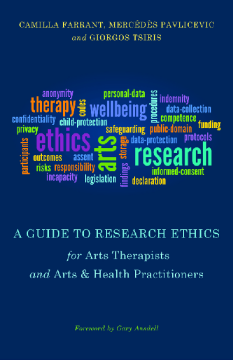
BOOK
A Guide to Research Ethics for Arts Therapists and Arts & Health Practitioners
Giorgos Tsiris | Camilla Farrant | Gary Ansdell | Mercedes Pavlicevic
(2014)
Additional Information
Book Details
Abstract
This practical guide aims to inspire ethically-aware practitioners to become ethically-aware researchers, evaluators and participants. Conducting a research project, whatever the setting, requires not only knowledge of research methods but also an in-depth understanding of research ethics. Embedded in 'real life' experiences of research ethics applications, this guide navigates the reader through research ethics procedures, drawing from legislation and a range of research ethics committee regulations. Although the emphasis is on research, ethical considerations presented in this guide are equally relevant and applicable to other types of enquiry, including monitoring and evaluation projects.
Whether leading a research project, being part of a research team or taking part as a research participant, this book is essential reading for all arts & health practitioners and arts therapists.
Camilla Farrant trained as a music therapist at Nordoff Robbins (London, UK) after reading Music at Christ's College, Cambridge University and studying the cello and piano at the Royal Academy of Music. She is the founder of and music therapist for The Music Therapy Tree, an organisation that provides music therapy to vulnerable children in mainstream education. She works as a research assistant at Nordoff Robbins, and performs professionally with The Massive Violins. Mercédès Pavlicevic trained as a music therapist at Nordoff Robbins (London, UK), and completed her doctoral studies at the University of Edinburgh's Department of Psychology with Colwyn Trevarthen. As a music therapist she has worked in a range of institutional and community settings, in Scotland, in the Lebanon and in South Africa. Mercédès was Director of the Master's in Music Therapy programme at the University of Pretoria until 2006 – this was the first accredited training programme on the African Continent. She has authored, co-authored and edited numerous music therapy publications. She is Research Director at Nordoff Robbins, and Research Associate at SOAS Music Department, at the University of London. Giorgos Tsiris trained as a music therapist at Nordoff Robbins (London, UK), where he is now conducting his doctoral research. He is a research assistant at Nordoff Robbins where he coordinates the monitoring and evaluation portfolio. He works as a music therapist with terminally ill adults and bereaved families at St Christopher's Hospice. He is the founding editor of the open access journal, Approaches: Music Therapy & Special Music Education, and coordinator of the Research Network of the British Association for Music Therapy.
Both novice and seasoned investigators will find much to learn from this humane, informative and critical text so clearly grounded in the experience of the authors as practitioners and researchers. Negotiating the formal research ethics process can be daunting, but this volume offers clear guidance and helpful practical advice for clearing the hurdles and appreciating the unforeseen ethical challenges of research.
Professor Stephen Clift, Sidney De Haan Research Centre for Arts and Health, Canterbury Christ Church University
The unique volume…comes from the workshop of my music therapy/researcher colleagues...They've formulated for you sound and systematic advice for the real-world practice of research ethics in the areas of arts therapies and community arts. Their Guide is down-to-earth, practical, no-nonsense, and it will probably save you buckets of tears before bedtime.
from the foreword by Gary Ansdell, Nordoff Robbins Music Therapy, London
Authors Farrant, Pavlicevic and Tsiris have provided a hands-on, practical and useful guide for arts-based practitioners who are navigating the complex terrain of research ethics. With helpful strategies for all phases of the process from ethical research design through ethics approval to research implementation, the authors strongly emphasize what should be the utmost concern for researchers, that is, the well-being of the clients served.
Dr. Cheryl Dileo, the Laura H. Carnell Professor of Music Therapy, Temple University, Philadelphia, USA
